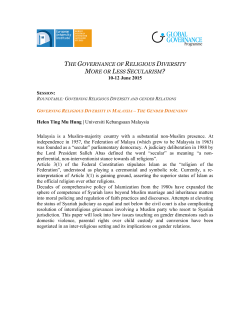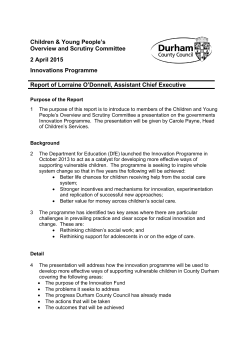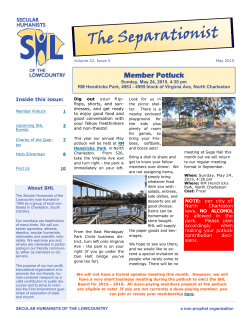
Leaflet Washington book 2015 (IACL)
Javier Martínez-‐Torrón & W. Cole Durham, Jr. (eds.), Religion and the Secular State: National Reports, Servicio de Publicaciones de la Facultad de Derecho de la Universidad Complutense (Madrid, Spain), 2015, 898 pages. The book can be ordered directly via e-‐mail: libder@ucm.es. Price: 40 euro + shipping costs. Discounted price for members of the IACL: 35 euro (+ shipping) (indicate the promotional code “IACL” in your e-‐mail order) Recent years have seen religion assume an increasingly visible place in public life, with mixed results that have been aptly described in terms of the “ambivalence of the sacred”. Every state adopts some posture toward the religious life existing among its citizens. That posture is typically contested, leading to constant adjustments at the level of constitutional and statutory law, as well as constantly evolving judicial and administrative decisions. While some states continue to maintain a particular religious (i.e., non-‐secular) orientation, most have adopted some type of secular system. Among secular states, there are a range of possible positions with respect to secularity, ranging from regimes with a very high commitment to secularism to more accommodationist regimes to regimes that remain committed to neutrality of the state but allow high levels of cooperation with religions. The attitude toward secularity has significant implications for implementation of international and constitutional norms protecting freedom of religion or belief, and more generally for the co-‐existence of different communities of religion and belief within society. Not surprisingly, comparative examination of the secularity of contemporary states yields significant insights into the nature of pluralism, the role of religion in modern society, the relationship between religion and democracy, and more generally, into fundamental questions about the relationship of religion and the state. This book contains national reports on the topic “Religion and the Secular State” from 58 reporters representing 43 countries, plus a general report written by Professors Javier Martínez-‐Torrón and W. Cole Durham, Jr. The reports, originally prepared for the 18th World Congress of the International Academy of Comparative Law, were published in Interim form in 2010. This final volume, with updated and sometimes extensively modified reports, was prepared to coincide with the 19th Congress in Vienna in July 2014. The topic “Religion and the Secular State”, if construed too broadly, could conceivably cover virtually every subject relating to law and religion. For that reason, the general reporters asked the national reporters to focus on a number of recurring tension points in the relationship of religion and the state: (1) the general social context; (2) the constitutional and legal setting; (3) religious autonomy (and autonomy of the state from religion); (4) legal regulation of religion as a social phenomenon; (5) state financial support for religion; (6) civil effects of religious acts; (7) religion and education; (8) religious symbols in public places; and (9) tensions involving freedom of expression and offenses against religion. Keeping in mind the variety of national circumstances, the aim has been to obtain a picture of the solutions provided by different countries to basically the same overarching problem: how the secular state deals with religion or belief in a way that preserves the reciprocal autonomy of state and religious structures and guarantees the human right to freedom of religion and belief. This volume has been published by the Publishing Service of Complutense University Law School, thanks to the contribution of the International Center for Law and Religion Studies of Brigham Young University. Orders can be sent directly via e-‐mail to: libder@ucm.es . Contents FOREWORDS & ACKNOWLEDGMENTS iii GENERAL REPORT (Javier Martínez-‐Torrón / W. Cole Durham, Jr.) ANDORRA (Santiago Bueno Salinas / Francisca Pérez-‐Madrid) ARGENTINA (Norberto Padilla) AUSTRALIA (Carolyn Evans) BELGIUM (Jan Velaers / Marie-‐Claire Foblets) BRAZIL (Evaldo Xavier Gomes, O. Carm.) CANADA (José Woehrling / Rosalie Jukier) CHILE (Ana María Celis Brunet / René Cortínez Castro S.J. / Maria Elena Pimstein) COLOMBIA (Vicente Prieto) CZECH REPUBLIC (Záboj Horák) ESTONIA (Merilin Kiviorg) FINLAND (Matti Kotiranta) FRANCE (Blandine Chelini-‐Pont / Nassima Ferchiche) GERMANY (Stefan Korioth / Ino Augsberg) GHANA (Kofi Quashigah) GREECE (Charalambos K. Papastathis / Nikos Maghioros) HUNGARY (Balázs Schanda) INDIA (Tahir Mahmood) IRELAND (Carmen Garcimartín / Maria Cahill) ISRAEL (Natan Lerner) ITALY (Alessandro Ferrari / Silvio Ferrari) JAPAN (Kyoko Kimpara) KAZAKHSTAN (Roman Podoprigora) LATVIA (Ringolds Balodis) MALTA (Andrea Bettetini) MEXICO (Alberto Patiño Reyes) NEPAL (Kanak Bikram Thapa) NETHERLANDS (Sophie C. Van Bijsterveld) NEW ZEALAND (Rex Tauati Ahdar) PERU (Carlos Valderrama Adriansén) PHILIPPINES (Raul C. Pangalangan) RUSSIA (Elena Miroshnikova) SCOTLAND (Francis Lyall) SERBIA (Sima Avramovic) SLOVAK REPUBLIC (Michaela Moravčíková) SPAIN (Zoila Combalía / María Roca) SUDAN (Giuseppe D’Angelo) SWEDEN (Maarit Jänterä-‐Jareborg) SWITZERLAND (René Pahud De Mortanges) TURKEY (Emre Öktem / Mehmet C. Uzun) UKRAINE (Gennadiy Druzenko) UNITED KINGDOM (Anthony Bradney) UNITED STATES (Catherine M.A. Mccauliff) UNITED STATES (Gene Shreve) URUGUAY (Carmen Asiaín Pereira) 1 65 75 92 109 136 155 192 219 234 248 262 292 318 331 341 383 395 412 433 445 466 475 487 509 522 537 542 559 572 582 596 619 624 641 656 674 700 721 736 758 780 793 807 813 SELECTED BIBLIOGRAPHY 839
© Copyright 2025













